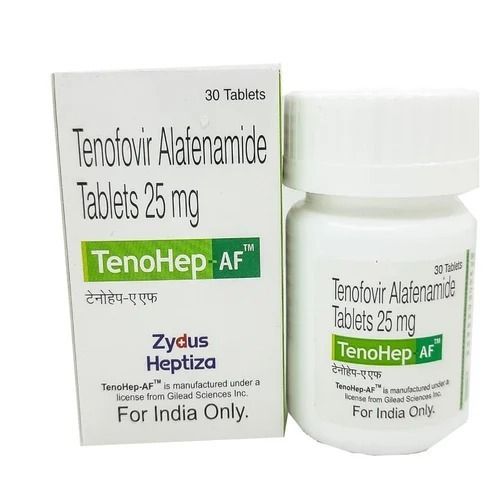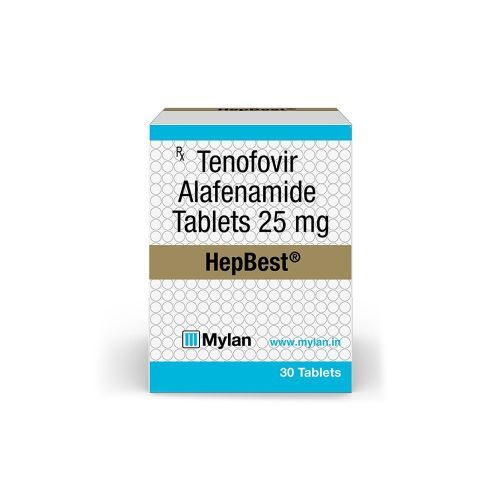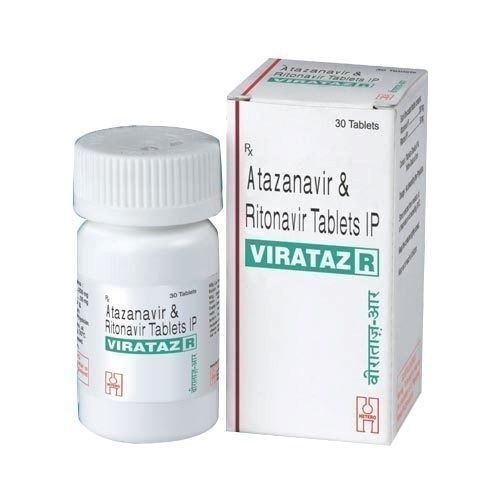Tenofovir Alafenamide Tablet
Product Details:
- Indication HIV-1 infection, Chronic Hepatitis B
- Salt Composition Tenofovir Alafenamide
- Dosage Form Tablet
- Feature Once daily dosing, improved renal and bone safety
- Ingredients Tenofovir Alafenamide Fumarate, Excipients
- Application Antiviral medication
- Physical Color/Texture White to off-white, film-coated tablet
- Click to View more
Tenofovir Alafenamide Tablet Price And Quantity
- 900 INR/Bottle
- 5 Bottle
Tenofovir Alafenamide Tablet Product Specifications
- Tablet
- 24 months
- Antiviral medication
- Tenofovir Alafenamide
- Tenofovir Alafenamide Fumarate, Excipients
- Odorless
- Once daily dosing, improved renal and bone safety
- White to off-white, film-coated tablet
- HIV-1 infection, Chronic Hepatitis B
- Store below 30C, protect from moisture
Tenofovir Alafenamide Tablet Trade Information
- Cash Advance (CA), Cash in Advance (CID)
- 1000 Bottle Per Week
- 4 Days
- All India, South India, Central India, West India, North India, East India, Gujarat, Karnataka, Kerala, Lakshadweep, Mizoram, Meghalaya, Manipur, Andhra Pradesh, Bihar, Chandigarh, Daman and Diu, Goa, Jharkhand, Odisha, Punjab, Assam, Delhi, Dadra and Nagar Haveli, Andaman and Nicobar Islands, Arunachal Pradesh, Chhattisgarh, Haryana, Himachal Pradesh, Jammu and Kashmir, Madhya Pradesh, Maharashtra, Nagaland, Rajasthan, Sikkim, Tamil Nadu, Telangana, Tripura, Pondicherry, Uttar Pradesh, Uttarakhand, West Bengal
Product Description
Tenofovir alafenamide (TAF) is an antiretroviral medication used in the treatment of HIV infection. It belongs to the class of drugs known as nucleotide reverse transcriptase inhibitors (NRTIs).
Tenofovir alafenamide is a prodrug of tenofovir, meaning it is metabolized in the body into its active form, tenofovir. Tenofovir works by inhibiting the action of reverse transcriptase, an enzyme that HIV needs to replicate. By interfering with HIV replication, tenofovir helps to reduce the viral load in the body and slow down the progression of HIV infection.
Tenofovir alafenamide is known for its improved safety profile compared to the older formulation of tenofovir, tenofovir disoproxil fumarate (TDF). It has been associated with lower risks of kidney toxicity and bone density loss.
The dosage of tenofovir alafenamide tablets can vary depending on the specific treatment regimen prescribed by a healthcare provider. Typically, tenofovir alafenamide is used in combination with other antiretroviral medications as part of a comprehensive HIV treatment regimen known as antiretroviral therapy (ART).
Common side effects of tenofovir alafenamide may include nausea, diarrhea, headache, fatigue, and changes in kidney function. It's important for individuals taking tenofovir alafenamide to adhere to their prescribed dosage regimen consistently and to report any unusual or severe symptoms to their healthcare provider promptly.
As with any medication, tenofovir alafenamide tablets can interact with other drugs, so it's important for patients to inform their healthcare provider about all medications, supplements, and herbal products they are taking before starting tenofovir alafenamide therapy.
Overall, tenofovir alafenamide is an important component of HIV treatment and has been shown to be effective in helping people with HIV manage their condition and improve their quality of life.
Exceptional Antiviral Efficacy
Tenofovir Alafenamide 25 mg targets viral replication in both HIV-1 and chronic Hepatitis B, offering a potent defense in the management of these conditions. Its advanced formulation enables increased efficacy at a lower dose, with daily oral administration simplifying treatment. Consult your healthcare provider to determine if it fits your therapeutic regimen.
Enhanced Safety Profile
The tablet's improved renal and bone safety sets it apart from previous tenofovir formulations. Its higher intracellular concentration allows effective virus control while reducing the risk of kidney or bone complications. This safety makes it an appealing choice, especially for long-term management of HIV and Hepatitis B.
Convenient Once-Daily Dosing
With once-daily administration, Tenofovir Alafenamide 25 mg promotes adherence and simplifies antiviral therapy. Its film-coated tablet format is easy to swallow and comes in flexible packaging options-either in bottles or blister packs-catering to both clinical and personal use cases.
FAQ's of Tenofovir Alafenamide Tablet:
Q: How should Tenofovir Alafenamide 25 mg tablets be taken?
A: Tenofovir Alafenamide tablets are intended for oral use and should be taken once daily, exactly as prescribed by your healthcare provider. Do not adjust your dose without consulting your physician.Q: What are the primary benefits of Tenofovir Alafenamide compared to older tenofovir medications?
A: This medication offers improved safety for kidneys and bones due to higher bioavailability at a lower dose, reducing potential side effects while maintaining antiviral effectiveness.Q: When is Tenofovir Alafenamide prescribed?
A: It is prescribed for adults and adolescents for the treatment of HIV-1 infection and chronic Hepatitis B virus infection, based on clinical assessment by a healthcare provider.Q: Where should I store Tenofovir Alafenamide tablets?
A: Store the tablets below 30C in a dry place, away from moisture. Keep the bottle or blister pack tightly closed and out of reach of children.Q: What should I do if I miss a dose?
A: If you miss a dose, take it as soon as you remember. If it's almost time for your next dose, skip the missed dose-do not double up. Continue with your regular dosing schedule.Q: Can I take Tenofovir Alafenamide with other medications?
A: Certain medications, such as dofetilide or adefovir, should not be taken with Tenofovir Alafenamide. Inform your healthcare provider about all the medications you are taking before starting treatment.Q: Who should consult a doctor before using Tenofovir Alafenamide?
A: Patients who are pregnant, planning pregnancy, or have renal impairment should consult their healthcare provider for individual risk assessment and possible alternative therapies.
Price:
- 50
- 100
- 200
- 250
- 500
- 1000+







 Contact Us
Contact Us
